#Bi-Polar Disorder
Text
I have terrible anger issues, I can handle differences of opinion just fine but the second it even feels like someone is mocking me my blood pressure soars and I have trouble controlling myself, even if I know it's over something stupid I have trouble calming myself down, it often escalates so that I'm feeling rage at just about everything.
I wonder if this is more due to ADHDs emotional dysregulation or my bi-polar rage issues. Or maybe it's so bad because they both combine into one clusterfuck.
0 notes
Text
They Have Bi-Polar Disorder, What Do I Do?

So, you have found out that a loved one—be it a family member, partner, or roommate has received a bi-polar diagnosis. It’s expected that you may have some concerns, given how those with bi-polar diagnoses are portrayed in the media—adjectives like ‘moody’, ‘unpredictable’, and ‘unsafe’ litter different creative avenues that utilize bi-polar and other mood disorders as ‘red flags’ in a story.
The truth is, living with a person who has bipolar disorder can be just as safe and manageable as living with a neurotypical person—with your understanding and support.
Individuals with bipolar disorder have full capacity to lead fulfilling lives and maintain healthy relationships, and by recognizing and supporting that, you have a unique capacity to be able to help and assist that person to have a stable home to return to when facing the world’s prejudices.
One common misconception is that bipolar individuals are always unpredictable and prone to violent behavior. However, this is not the case for the vast majority of people with bipolar disorder. With proper treatment and support, including medication management and psychotherapy, individuals with bipolar disorder can (and do) manage their symptoms effectively and lead stable, fulfilling lives.
Another misconception is that living with someone who has bipolar disorder is always going to be difficult and stressful. While supporting a loved one with bipolar disorder can have its challenges, it can also be very rewarding. Many people with bipolar disorder are correlated to be highly intelligent1, creative2, and compassionate individuals who contribute positively to their relationships and communities.
It is important to remember that bipolar disorder is a medical condition that requires understanding and empathy. With the right treatment and support, individuals with bipolar disorder can live fulfilling lives and maintain healthy relationships with their loved ones—but communication and active support is key.
Playing a part in supporting a loved one with bipolar disorder at home can make a significant difference in their well-being. Here are some ways to help:
Learn about the disorder: Educate yourself about bipolar disorder3 to better understand the challenges your loved one may face. This can help you provide more effective support.
Encourage treatment: Encourage your loved one to follow their treatment plan, including taking medication as prescribed and attending therapy sessions. Offer to help schedule appointments or provide reminders where relevant and able.
Create a supportive environment: Foster a stable and predictable home environment. Maintain a regular daily routine and ensure a good balance of rest, activity, and social interaction for yourself, and encourage the same for your loved one.
Be patient and understanding: Be patient and empathetic during mood swings or difficult episodes. Understand that symptoms of bipolar disorder are beyond their control, and that challenges arising from these episodes may be better addressed at a different time.
Communicate openly: Encourage open and honest communication. Listen actively and validate their feelings. Express your support and willingness to help.
Encourage healthy habits: Support healthy lifestyle choices, such as regular exercise, a balanced diet, and adequate sleep. Encourage a shared space avoidant of alcohol and recreational drugs, as they can worsen symptoms.
Help with stress management: Assist your loved one in finding healthy ways to manage stress, such as mindfulness, yoga, or relaxation techniques.
Monitor mood changes: Pay attention to changes in mood or behavior and communicate any concerns directly. Help the loved one to develop a mood chart or a shared communication system to best address challenges before they arise.
Offer practical help: Help with daily tasks when needed, such as household chores, childcare, or running errands. Bipolar disorder often leads to difficulties in managing ‘executive tasks’ that come with house (and self) maintenance.
Take care of yourself: Supporting someone with bipolar disorder can be challenging. Remember to take care of your own physical and emotional well-being. Seek support from friends, family, or a therapist if needed.
Fighting the stigma of bipolar disorder can be challenging, and your loved one will likely learn that prejudice surrounding the diagnosis and the need for self-advocacy are interconnected—there are several strategies that can be employed to address both aspects effectively.
Sharing personal stories and experiences is a powerful tool in combating stigma. By openly discussing the individual journey with bipolar disorder, your loved one can raise awareness and foster understanding among their peers and communities.
Seeking support from others facing similar challenges can also be empowering. Support groups4 for individuals with bipolar disorder provide a safe space to share experiences and coping strategies, contributing to a sense of community and solidarity.
Finding a sense of belonging in numbers can also help in promoting advocacy for change surrounding misrepresentation of bipolar disorder. By addressing misinformation and promoting accurate portrayals of the condition, individuals can help change public perceptions.
By implementing these strategies, you and your loved one can help fight the stigma of bipolar disorder, advocate for change, and support others affected by the condition.
Check out some of the resources of Bipolar Disorder here.
0 notes
Text
The Difference Between Two Miseries
Depression and Bipolar Disorder (formerly known as manic-depressive illness) are two distinct mental health conditions, each characterized by unique symptoms and patterns of mood disturbance.
Depression, often referred to as Major Depressive Disorder (MDD), is marked by persistent feelings of sadness, hopelessness, and a lack of interest or pleasure in activities that were once enjoyed.…

View On WordPress
#Bi-polar disorder#depression#helping#helpline#information#Informative#Mental Health#seek help#suicide prevention hotline#support#You are not alone
0 notes
Text
The Rubber Biskit Road Show Presents "Never Say Never: An Epic Journey – Volume One, Part Eleven – Hasta La Vista Baby"
The Rubber Biskit Road Show Presents “Never Say Never: An Epic Journey – Volume One, Part Eleven – Hasta La Vista Baby”
Lee Roy George, now resting in the cold and unforgiving Kansas soil, leaves a void in The GYPSY’s heart. As he bids farewell to the George family and embarks on the journey back to his home in Saint Joseph, Missouri, the cold and harsh trip mirrors the emotions that swirl within…

View On WordPress
#Bi-Polar Disorder#Death#Family#Father#Funeral#History#Kansas#Mental Illness#Missouri#Motorcycle#Saint Joseph#Schizophrenia#The GYPSY#Topeka#Truth
0 notes
Text
Vent under cut

I hate how i just be vibing then all of a sudden i want to cry for no reason i just want to go home but the place(s) i call home doesn't fucking exist iam missing people that don't exist i am lonely and i fucking hate it .i want all of this to end .will it ever end? I am tired oh so very tired...
#🎭 rambles#alterhuman#otherkin#kin stuff#kin shift#fictionkin#therian#demon kin#nonhuman#moth therian#rabbits alterhuman tag#(i think i may also have some kind of bi polar disorder i hope fucking not)#kin vent
8 notes
·
View notes
Text

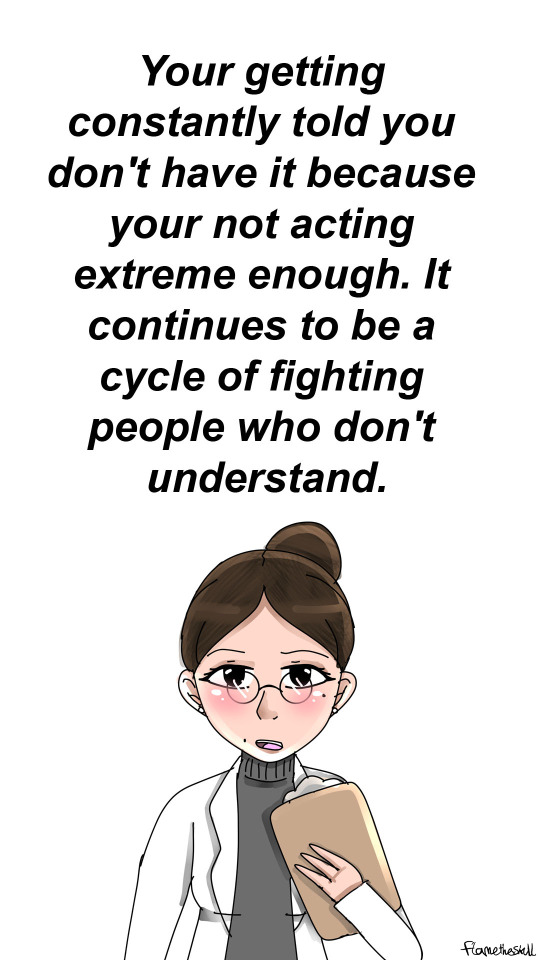

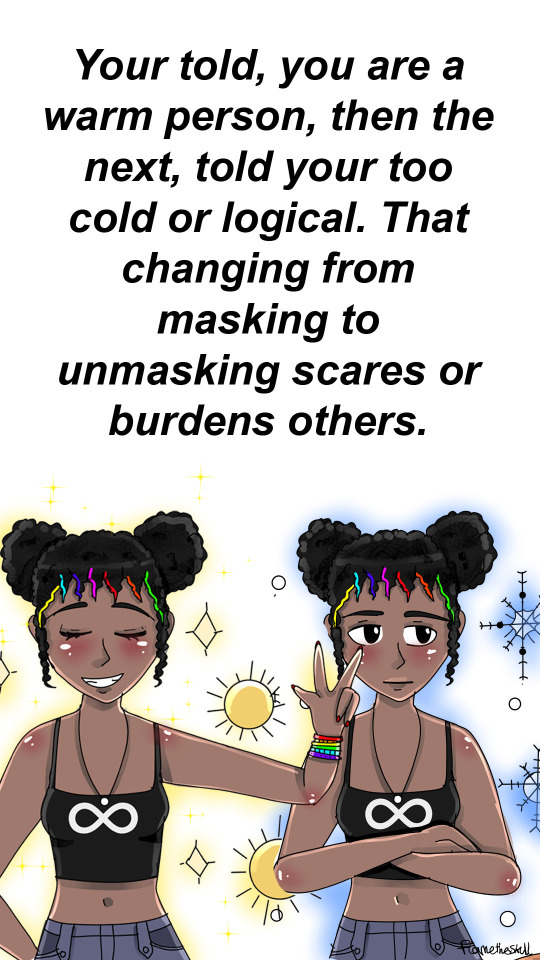
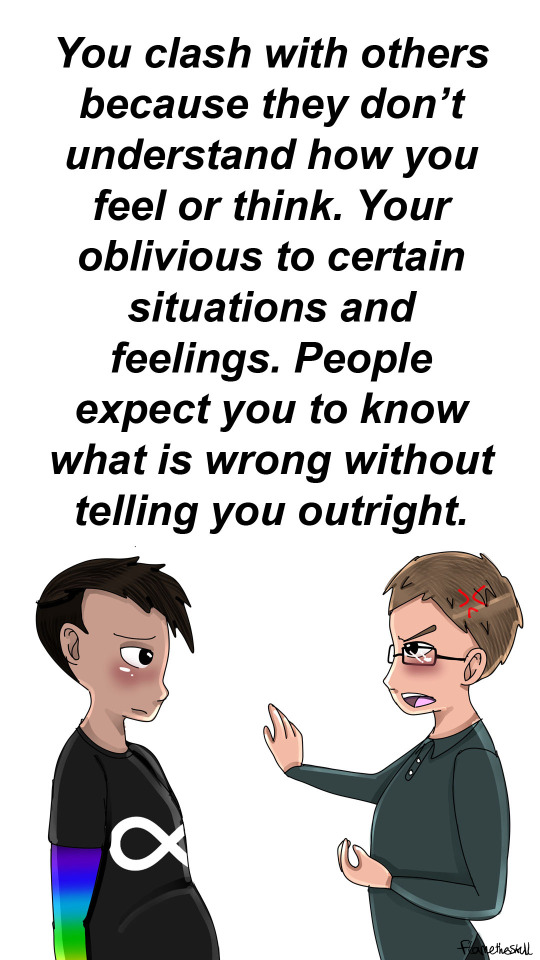
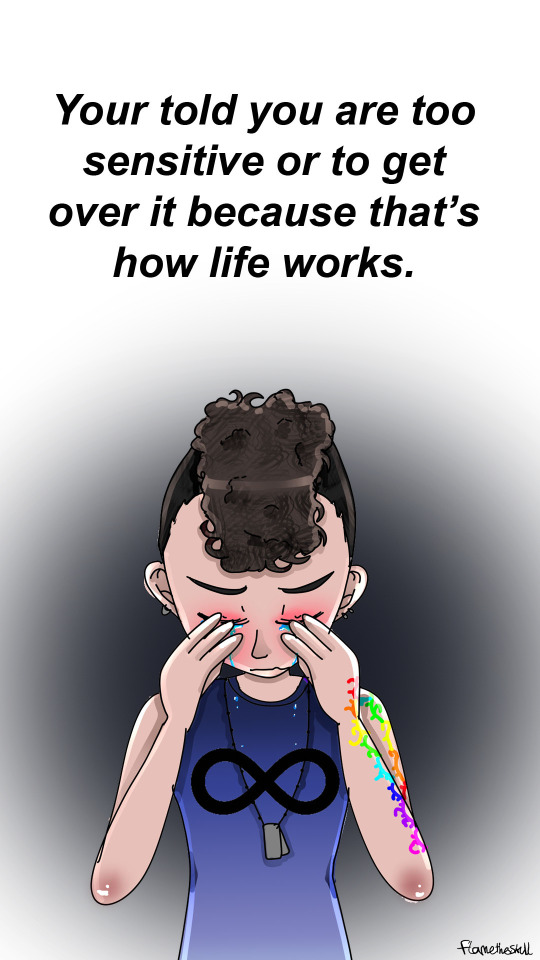
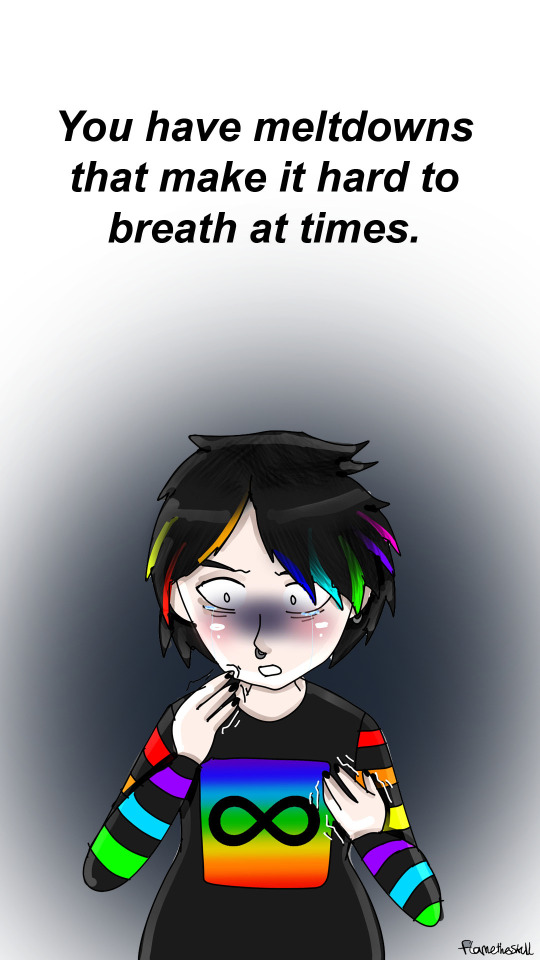

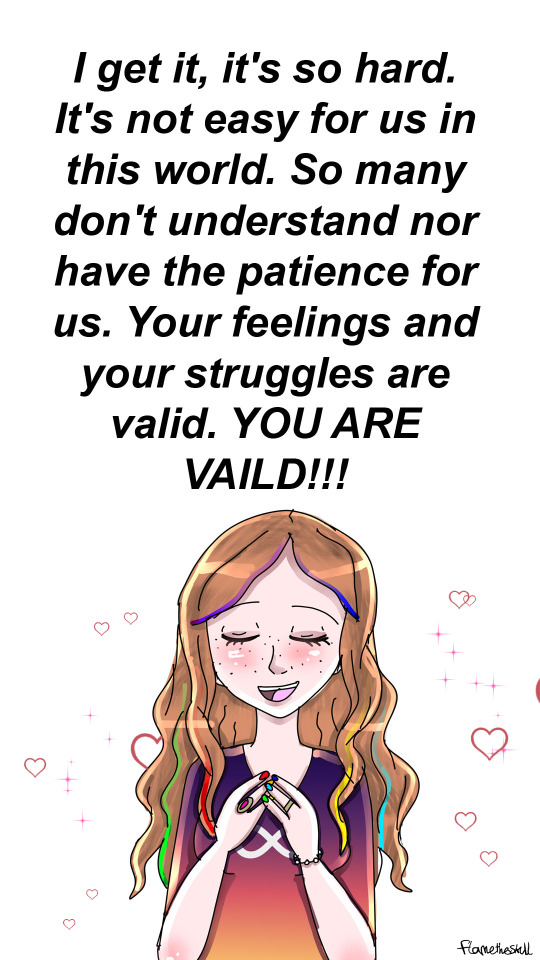
A comic about Autism. I hope some of you can relate.
#autistic artist#autism#autistic experiences#autistic#autism awareness#autism comic#autism community#OCD#ADHD#AUHD#dyslexia#dyscalculia#autoimmune disorder#autoimmune disease#bpd#ptsd#cptsd#bi polar#anxiety#depression#neurodivergent#neurodiverse artist#comics
48 notes
·
View notes
Text
Yall will go fucking rabid, screaming and crying tripping over yourselves to make sure no one says the word ""insane"" but its dead fucking silent when those same people you're apparently "defending" try to advocate for themselves. And if not completely ignored, we're just talked over. Again and again and again. Sureee. Calling someone insane isn't nice i guess but for fucks sake can we focus on something that actually?? matters?????
Instead of trying to baby proof the internet from meanie bad words, maybe it would be more useful to focus on what you can start doing right now that will actually help:
Stop stigmatizing us.
If people were genuinely interested in helping us when they're barking the "don't say insane!!" rant, (They're not.) then it literally wouldn't take anymore than doing your own research to understand what and who they're trying to help. It can be hurtful, but someone calling me insane will never be anywhere near as harmful as the complete lack of even basic knowledge the public has about the disorders they like to stigmatize and laugh at. I can name so many just off the top of my head:
BPD (Borderline personality disorder) is extremely common. There are over 3 million cases every year. A majority of people who have BPD developed it because they were victims of early childhood truama or neglect, but the world has made it out that they're always going to be inherent abusers. Same with NPD. (Narcissistic personality disorder) It's painted that all of them are evil monsters, even though the majority developed the disorder after being abused themselves in childhood. (find a more in depth study/explanation here!)
Instead of focusing your "support" on telling people not to say insane, why don't you focus on visibility and acceptance for victims with disorders?
OCD (Obessive compulsive disorder) is an anxiety disorder associated with intrusive thoughts. Saying, "I'm so OCD" because you like to color code your pencils is careless sterotyping but an extremely common saying.
So why don't you focus on educating yourself/others when you make those mistakes?
Psychosis is common. It is not an illness itself, but a symptom. 3 in 100 people will likely have at least one psychotic episode in their lives, even those without disorders associated with it, after traumatic events. (Ex. like the death of a loved one or a natural disaster.)
So why don't you focus on normalizing reactions to truama? Even the "crazy" ones?
((For most of the extra information above^, I've linked Mayo Clinic webpages. They are easily accessible with accurate descriptions. They cover all symtoms and causes while still staying unbiased and offering support.))
I really could go on and on but this whole thing is just giving me a fucking headache. If you've been on the "dont say insane" bandwagon with absolutely nothing else to show, either shut up and stop pretending you have some moral high ground on illnesses you dont know shit about, or take a step off of your high horse and LISTEN TO US. If you're defending people with disorders, then learn from people with disorders and what we actually care about and need your support for.
We appreciate the effort, but if you're at all genuine about wanting to help, we need you to put that effort into what actually matters to us.
#intentional or not the whole dont say insane' thing feels more like an excuse to talk about us even less than you already do#this is so long winded and impulsive what do i even tag im just tired#bpd#bi polar disorder#npd#ocd#psychosis#mental health awareness#long post#rant#ok to reblog#but be fucking nice please
215 notes
·
View notes
Text

#text#saddest text i’ve ever gotten#borderline personality disorder#bpd#mental illness#personal#lol#actually mentally ill#mentally ill but hot#cute but psycho#bi polar#actually borderline#actually bpd#honesty hour
11 notes
·
View notes
Text
Mental Health Ramblings
Talked about my, er, unbalanced relationship with writing today in therapy. Got a lot off my chest I didn't know was sitting there.
I need to stop looking for meaning in my fanfiction writing lol. I AM a "writer", and I've not done a great job of incorporating that into my career or even hobbies or anywhere outside the very narrow scope of fanfiction and blogging on social media. I can look for it elsewhere, where it makes sense to look for it if I care that much. I also don't have to find meaning in it at all. That's probably a holdover from my pentecostal/judeo-christian/evangelical upbringing that needs further deconstructing.
Perfectionism has killed most of my writing projects since my early 20's. I can't accept the first draft of anything and in the revision process I burn out and experience compounded shame.
I can't accept that I am mediocre (gifted xtian white AFAB child first in college student council president never constructively criticized in adolescence etc etc), so everything has to be revised to make it appear as exceptional as I'm capable of making it. Even if that means piggy backing off someone else's talent (i.e commissioning art for fics).
I think I have something to prove because of how poorly my college experience went.
All these things get in the way of writing being neutral, fun, positive, or a good thing for me. It makes writing harmful to my mental well being to an unacceptable extent.
SO the game plan is thought-interruption. First I have to learn to identify when perfectionism has begun to creep in. That's going to take work. When I've got that down better, I can begin to respond to the thoughts in a way that interrupts them.
The old formula has been:
Brain: This is awful. That means you're awful.
Me: Yup. I am worthless, this is worthless, it's not just not good it's actively reducing the value of all writings everywhere as a whole. I am a stain on humanity. I am a burden-
Then the writing is interrupted, time passes, shame accumulates, yadda yadda and I have to wait for the next manic high to try and recapture the project, and usually for only as long as the high lasts.
So now, the script is:
Brain: This is awful. That means you're awful.
Me: That's ridiculous. Moving along.

I don't know if anyone can relate to that or not. I feel good about how I'm going to address it. Love my therapist.
To be very clear, I know some of that sounds a little harsh. I've been in therapy a long time, and I spent years (almost 9) coddling myself and being coddled in sessions. None of these listed conclusions came from my therapist. She does a lot of sitting and listening, and correcting when I become self loathing or I'm just plain on the wrong track. Maybe you want to argue with me labeling myself mediocre or say something to the contrary to emotionally comfort me, maybe not. My journey with that has been a lifetime, and no matter what, I'm currently striving for peace of mind. No matter how good the exceptional label feels, it hasn't ever brought me much peace of mind. So it's not a debate about my level of skill (because again I'm trying to NOT look for meaning or self value in fanfiction) and if I'm being too hard on myself (I probably am, my brain is still addicted to the idea that someone/thing MUST be OR ELSE). It's about my inability to accept myself as I am.
The conversation about how to take writing to other parts of my life isn't one I know how to have yet. I feel like a student without a teacher. I don't know what to do. Fiction isn't where I naturally excel. I probably need a lot more education. See? See where this goes?
That's all.
#dead dove speaks#mental health ramblings#mental health#bi polar disorder#bi polar 2#bi polar#dbt skills#dbt therapy#writing#writing dysfunction
4 notes
·
View notes
Text
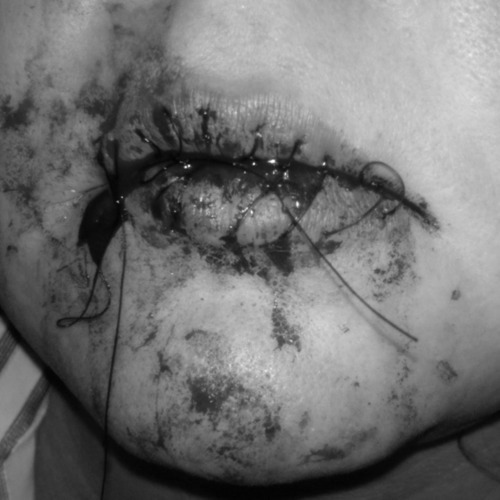
2 notes
·
View notes
Text
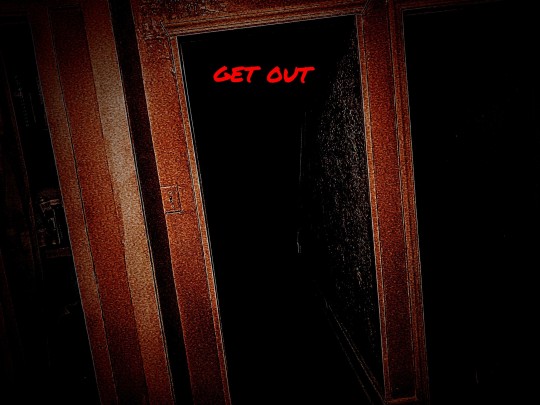
#horror#scary pictures#creepy photography#creepy stuff#creepy pictures#creepy#creepy art#wierdcore#dreamcore#dreamscape#dreams#gritty#gritty pictures#dark pictures#bipolar disorder#bi polar#angercore#anger#frustration#loner life#loners#antisocial#introvert#introversion#introverts#isolation#confusion#depression#agoraphobia#agoraphobic
7 notes
·
View notes
Text
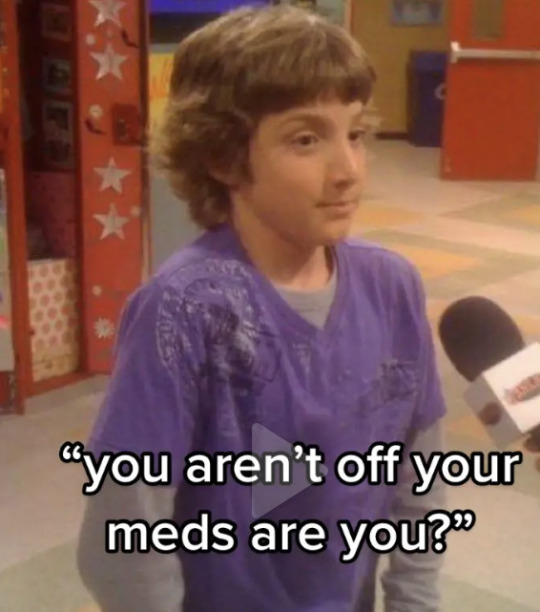
37 notes
·
View notes
Text
The Rubber Biskit Road Show Presents "Never Say Never: An Epic Journey – Volume One, Part Ten – The Kindness Of Strangers"
The Rubber Biskit Road Show Presents “Never Say Never: An Epic Journey – Volume One, Part Ten – The Kindness Of Strangers”
In the poignant tenth part of “Never Say Never: An Epic Journey – Volume One,” The GYPSY reflects on the aftermath of the memorial service and the wake for the father he never knew. On this cold March day in 1979, he pieces together the fragments of knowledge gleaned from a…

View On WordPress
#Bi-Polar Disorder#Book#Death#Family#Father#Funeral#Gypsy#History#Home#Kansas#Mental Illness#Romani#Schizophrenia#The GYPSY#Topeka
0 notes
Text
Welp. I just typed bipolar into the search bar on Tumblr and it instantly popped up with "Are you okay?" Like, thanks, but I am not suicidal and I don't need the hotline just because I am bipolar. *Sigh* I like searching for other people that go through the same stuff as me. There isn't even a tag for the proper spelling of #bipolar. Sheesh.
36 notes
·
View notes
Text
does bipolar still exist i dont see people saying bipolar anymore
#emergency broadcast system#Tbh i thought bpd was bi polar disorder for.... forever i think. not recently
8 notes
·
View notes
Text
I can't tell how I feel anymore...
Mostly tired.
#lithium#actually schizospec#mental disorder#mental health#mental illness#mentally ill#mentally unstable#mentalwellness#psychosis#schizophrenia#abilify#seroquel#bipolar disorder#bi polar#bi polar 1#bipolar blog
15 notes
·
View notes